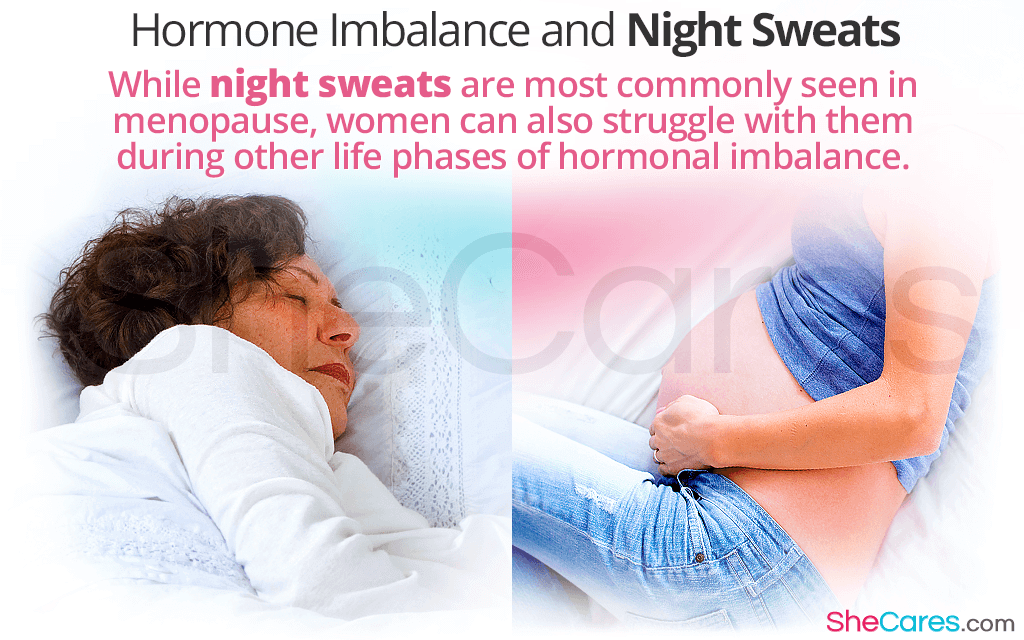While night sweats are most commonly a struggle that many menopausal women share, this pesky symptom can also be seen during other phases of hormonal significance in a woman's life, suggesting a strong night sweats-hormones link.
Keep on reading to discover more about hormone imbalance and night sweats, starting understanding the basics of hormonal imbalance before discussing if imbalanced hormones cause night sweats.
What Is Hormonal Imbalance?
Hormonal imbalance is a term that simply describes a state when there is too much or not enough of certain hormones in the body.
For women, this is most commonly related to reproductive hormones, such as estrogen and progesterone, although a handful of other hormones might also be in play.
There are certain phases in a woman's life when hormonal imbalance is a normal and somewhat expected state, such as during puberty, pregnancy, or menopause. Other cases of imbalanced hormones, however, are due to disease and require treatment.
About Night Sweats
Night sweats, which are oftentimes called nocturnal hot flashes, are one of the most common menopause symptoms.
They are classified as vasomotor symptoms as their mechanism involves body temperature regulation, among other physiological changes. When they strike at nighttime, they can be powerful enough to interrupt a woman's sleep and, oftentimes, her functioning the following day.
So, Can Hormone Imbalance Cause Night Sweats?
Yes, hormonal imbalance can cause night sweats, although there is no scientific evidence confirming this relationship.
The reason why hormonal imbalance and night sweats are associated with one another is because they are mostly observed in women during states of hormonal fluctuations. These stages, as aforementioned, include puberty, pregnancy, and menopause.
In fact, up to 75% of women going through the menopausal transition suffer from night sweats, and about one in three of those who are pregnant also experience them.1,2
How Does Hormone Imbalance Cause Night Sweats?
In menopausal women, night sweats most likely happen as a result of rapid hormonal changes as the ovaries shut down their production, marking the end of women's reproductive years.
The hypothalamus, a small region in the brain often called the body's inner thermostat, is responsible for maintaining body temperature. Because hormones can have various effects on the hypothalamus, their imbalanced levels can directly disrupt its functioning, in this case, temperature control. An incorrect perception of body temperature triggers a cooling mechanism, leading to night sweats.
How Can I Cope with Night Sweats due to Hormonal Imbalance?
Women can implement a number of coping strategies to reduce the frequency of night sweats and improve the quality of their sleep. They include the following:
- Choosing the right nightwear and bed sheets for night sweats
- Keeping the bedroom cool with air conditioning, fans, or open windows
- Having a cool glass of water next to the bed
- Avoiding alcohol and hot or spicy food, especially right before bedtime
Conclusions
While the aforementioned coping strategies can help women survive the night without waking up drenched in sweat, they are not sustainable in the long-term. A more effective and long-lasting approach to dealing with night sweats is by directly tackling their cause, which is hormonal imbalance. Luckily, middle aged women can often battle their symptoms with the most natural and least risky hormonal imbalance treatments, such as lifestyle habits and herbal supplements, without having to rely on more invasive hormone therapies or other conventional methods.
Sources
- Arizona State University. (n.d.). The Brain. Retrieved February 12, 2020 from https://askabiologist.asu.edu/bird-hypothalamus
- Journal of Applied Physiology. (2001). Genome and Hormones: Gender Differences in Physiology. Invited Review: Estrogens effects on the brain: multiple sites and molecular mechanisms. Retrieved February 12, 2020 from https://journals.physiology.org/doi/pdf/10.1152/jappl.2001.91.6.2785
- Journal of Mid-Life Health. (2019). Menopausal Hot Flashes: A Concise Review. Retrieved February 12, 2020 from https://www.ncbi.nlm.nih.gov/pmc/articles/PMC6459071/
- Society for Endocrinology. (2018). Hypothalamus. Retrieved February 12, 2020 from https://www.yourhormones.info/glands/hypothalamus/
Footnotes:
- John Hopkins Medicine. (n.d.). Introduction to Menopause. Retrieved February 12, 2020 from https://www.hopkinsmedicine.org/health/conditions-and-diseases/introduction-to-menopause
- Fertility & Sterility. (2013). Prospective Evaluation of Hot Flashes during Pregnancy and Postpartum. Retrieved February 12, 2020 from https://www.ncbi.nlm.nih.gov/pmc/articles/PMC4167790/

